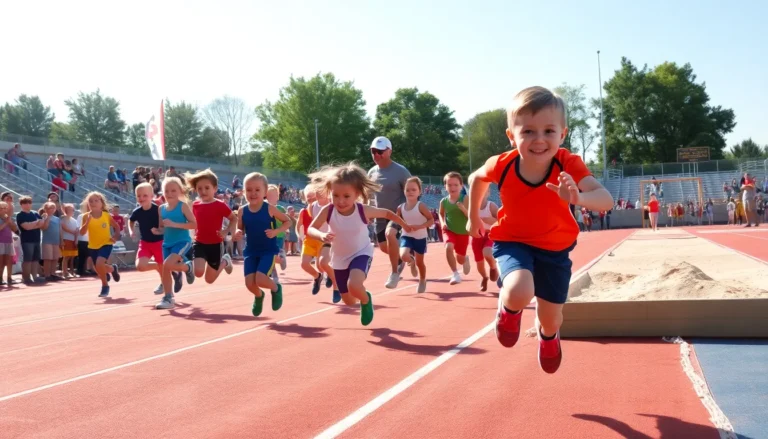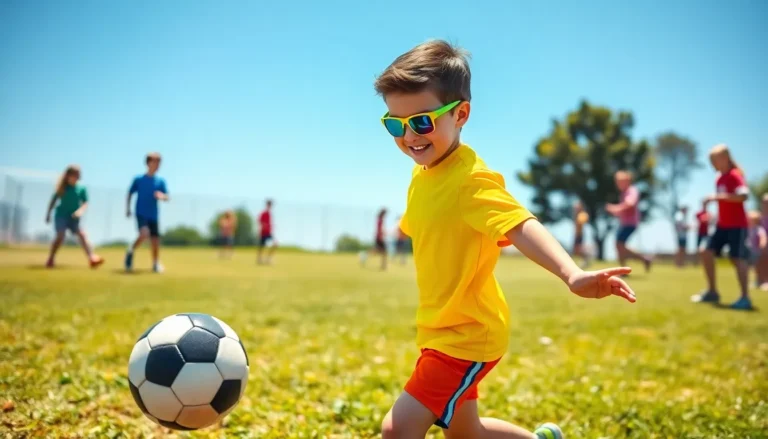Table of Contents
ToggleFinding the right sport for kids with ADHD can feel like searching for a needle in a haystack. With boundless energy and a knack for distraction, these little dynamos need activities that keep them engaged and focused. Luckily, some sports are tailor-made to channel that energy into something productive—and fun!
Overview of ADHD and Physical Activity
ADHD affects attention, impulse control, and activity levels. Engaging in physical activity can benefit children with ADHD by improving focus and reducing impulsivity. Regular exercise releases endorphins, which enhance mood and increase motivation. Activities that require coordination and strategy often keep them engaged, catering to their energetic nature.
Structured sports offer routines and expectations, creating a sense of stability. This predictability helps children with ADHD feel more secure and focused during play. Team sports can develop social skills, encouraging interaction with peers while focusing on teamwork.
Individual sports like swimming or martial arts promote self-discipline and concentration. These activities allow children to set personal goals and experience individual achievements. Studies suggest that children participating in such activities show improved attention span and reduced hyperactivity.
Optimal outcomes occur when physical activity is consistent and aligned with children’s interests. Finding the right sport encourages them to remain active and engaged. Parents and coaches should monitor physical activity’s influence on mood and behavior, adjusting as needed. Celebrating progress reinforces positive behaviors, motivating children to continue participating.
Research indicates that physical activity also improves executive function, which includes planning, prioritizing, and time management. Incorporating movement breaks during other activities further enhances focus. With the right approach, sports can serve as a valuable tool in managing ADHD symptoms effectively.
Benefits of Sports for ADHD Kids
Engaging in sports fosters numerous benefits for children with ADHD. Regular participation in physical activities not only enhances their well-being but also supports overall development.
Improved Focus and Concentration
Sports activities require attention to detail and strategic thinking. Such engagements help improve children’s ability to concentrate on tasks, both during play and in academic settings. Structured environments in team sports or focused practices in individual sports lead to the development of better attention skills. Research highlights that children who participate in physical activities exhibit improved executive function, further supporting focus enhancement. According to studies, routine involvement in sports significantly reduces impulsivity, allowing kids to channel their energies productively. Increased physical activity also correlates with higher serotonin levels, which can enhance mood and stability, ultimately promoting sustained concentration.
Enhanced Social Skills
Participation in sports provides a platform for children to develop interpersonal skills. Team sports, in particular, require communication and cooperation, encouraging kids to work together. As they engage in team dynamics, kids learn how to navigate social interactions more effectively. New friendships often blossom from shared activities, fostering a sense of belonging. Engaging in sports also teaches important lessons about winning and losing, helping children manage emotions in diverse situations. Importantly, these social interactions can lead to improved self-esteem, which plays a crucial role in healthy social development. Structured play in sports promotes inclusivity, making it easier for children with ADHD to bond with peers.
Criteria for Choosing the Best Sports
Selecting sports for children with ADHD involves several crucial criteria. Understanding age appropriateness and levels of team interaction helps ensure a positive experience.
Age Appropriateness
Age relevance is essential when choosing sports for kids with ADHD. Different age groups exhibit varying physical and emotional development levels. Sports that align with a child’s development can enhance engagement and skill acquisition. Younger children benefit from activities that emphasize fun and basic skills, while older kids may thrive in more structured environments with rules. For instance, sports like soccer or swimming can provide suitable options for younger children, while teen participants may enjoy basketball or track, which demand higher levels of physical and strategic understanding. Age-appropriate sports encourage participation without overwhelming, promoting both skill development and enjoyment.
Levels of Team Interaction
Levels of team interaction play a significant role in choosing the right sports. Engaging with teammates fosters social skills and enhances a sense of belonging. Some children may feel more comfortable in smaller teams, where they can develop closer relationships. Smaller groups allow for more individualized attention and can reduce feelings of anxiety often associated with larger teams. Larger teams, however, provide opportunities to learn cooperation and teamwork dynamics essential in life. Assessing a child’s social preferences helps determine which interaction level will promote confidence and reduce stress. Sports like volleyball or league soccer offer balanced team structures that cater to varying comfort levels, enabling meaningful interactions while building essential skills.
Top Sports Recommendations
Engaging in the right sports can significantly benefit children with ADHD. Here are some top recommendations for team and individual sports.
Team Sports
Team sports foster social skills and create opportunities for children to bond with peers. Basketball encourages fast-paced interactions, necessitating quick decision-making and teamwork. Soccer enhances communication as players need to coordinate plays and defend positions. Baseball provides structured turns, which can help children with ADHD focus better during their moment on the field. Smaller teams, such as in volleyball, promote closer relationships, minimizing feelings of anxiety during play. These settings allow players to develop essential cooperation skills and improve their ability to handle emotional responses related to competition.
Individual Sports
Individual sports offer unique benefits by allowing children to work at their own pace. Swimming builds focus as children must pay attention to stroke techniques and breathing patterns. Martial arts instill discipline and concentration, teaching kids to control their movements and impulses. Gymnastics promotes body awareness, helping children develop coordination while channeling their energy productively. Running encourages personal goal setting, giving children a sense of achievement as they track progress. These activities can help reduce impulsivity while enhancing self-confidence and personal growth, aligning well with the interests and strengths of many kids with ADHD.
Tips for Parents and Coaches
Encouragement plays a vital role in the success of children with ADHD in sports. Praise children for their effort, not just their achievements. This approach fosters a growth mindset and motivates ongoing participation.
Establishing a routine provides children with ADHD stability and predictability. Consistent practice schedules during sports allow for emotional regulation and improved focus. Creating a structured environment helps maximize the benefits of physical activity.
Communication between parents and coaches is essential. Open discussions ensure everyone understands the child’s unique needs and preferences. Sharing insights about the child’s strengths and challenges aids in developing tailored strategies.
Flexibility is important when working with ADHD children. Adjusting practice sessions or game strategies based on the child’s energy levels can enhance their experience. Being receptive to modifications helps sustain interest and enjoyment in the sport.
Monitoring progress is key to identifying improvements in focus and behavior. Tracking changes in mood and attention during sports activities can provide valuable feedback. Documenting these outcomes encourages parents and coaches to celebrate advancements together.
Involvement in team dynamics cultivates valuable social skills. Encouraging children to participate in team-oriented activities strengthens their communication and cooperation. Sharing experiences with peers can lead to lasting friendships and self-esteem enhancement.
Each sport offers unique opportunities for skill development. Selecting a sport aligned with a child’s interests increases motivation and engagement. Assessing activities helps prioritize choices that resonate most with the child.
Lastly, patience is crucial during this process. Children with ADHD may face challenges while adapting to new sports environments. Maintaining a supportive attitude fosters resilience and encourages long-term dedication to physical activities.
Finding the right sports for kids with ADHD can make a significant difference in their lives. Engaging in physical activities not only channels their energy but also enhances focus and social skills. By selecting sports that align with their interests and developmental stages, parents and coaches can create a supportive environment for growth and self-confidence.
Encouragement and structured routines further foster a sense of stability and belonging. As children navigate the challenges of ADHD, participation in sports can lead to improved emotional well-being and valuable life skills. With the right approach and patience, kids with ADHD can thrive in their chosen sports, paving the way for a brighter future.








